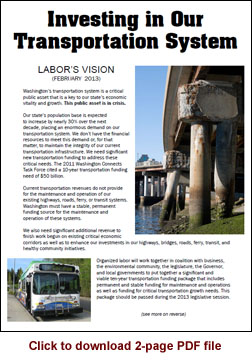NEWS ROUNDUP
Transportation moves, immigration bill emerges, service suffers…
Wednesday, April 17, 2013
STATE GOVERNMENT
 ► In today’s Spokesman-Review — House transportation budget passes — House Democrats passed a two-year, $8.4 billion spending plan for the state’s highways, bridges, ferries and bus systems on Tuesday, overcoming Republican objections about a controversial bridge over the Columbia River and the way tolls are set on roads and bridges.
► In today’s Spokesman-Review — House transportation budget passes — House Democrats passed a two-year, $8.4 billion spending plan for the state’s highways, bridges, ferries and bus systems on Tuesday, overcoming Republican objections about a controversial bridge over the Columbia River and the way tolls are set on roads and bridges.
ALSO at The Stand — Labor’s 5 Transportation Principles — 1) Maintain what we have now; 2) Invest in strategic economic corridors; 3) Increase state and local investment in roads, rail and transit; 4) Invest in livable communities; and 5) Build It in Washington!
► In today’s News Tribune — Tax package includes $1.27 billion for SRs 167, 509 and I-5 HOT lanes
► In today’s Columbian — Revised transportation revenue plan keeps $450 million for Columbia River Crossing
► In today’s Columbian — The Big Divide, Day 3: The road ahead — Will the region build on recent employment gains in the months and years ahead, or will we lose our footing and slide? The answer is hazy. The momentum-stalling fight over the Columbia River Crossing is a big reason why.
► In today’s Olympian — Lawmakers need to target useless tax breaks (editorial)
► From the WFSE, Council 28 — Donut holes for tax day
► At PubliCola — Sen. Tom votes against 9th order; Dream Act in peril — Democrats tried to force floor votes on the Reproductive Parity Act and the DREAM Act, two bills that Republican chairs in the Republican-controlled Majority Coalition Caucus had held in committee. The motion failed 25-23 with Sen. Tom joining Republicans in casting ‘no’ votes on the 9th order motion. Tom defended his decision to squash the Ninth Order, saying, “the problem with the Ninth is how do you get out of it? Once you go to the Ninth, senators can pull all sorts of bills.
 EDITOR’S NOTE — Of course, such concerns didn’t stop Sen. Tom last year when he defied the Democratic majority and voted with Republicans to go to the 9th order in order. They did it to pass a budget nobody had read yet and “all sorts of bills” on various other conservative priorities.
EDITOR’S NOTE — Of course, such concerns didn’t stop Sen. Tom last year when he defied the Democratic majority and voted with Republicans to go to the 9th order in order. They did it to pass a budget nobody had read yet and “all sorts of bills” on various other conservative priorities.
BOEING
► In the Seattle Times — Boeing to cut up to 300 senior engineers in California — Boeing will reduce its workforce at Southern California’s Space and Intelligence Systems unit by approximately 5% this year, cutting 250 to 300 senior non-management positions.
► In today’s (Everett) Herald — Boeing mum on 787 timeline — Federal regulators could nix long-range flights of Boeing’s 787, even if they approve the Dreamliner’s return to passenger service, the top aviation official said Tuesday.
IMMIGRATION REFORM
► In today’s Washington Post — Immigration bill filed in Senate; opponents hope to use delays to kill it — A bipartisan group of lawmakers formally filed an 844-page immigration bill on the Senate floor early Wednesday, setting the stage for months of public debate over the proposal. Leading Capitol Hill opponents of the proposal to overhaul the nation’s immigration system are coalescing around a strategy to kill the bill by delaying the legislative process as long as possible, providing time to offer “poison pill” amendments aimed at breaking apart the fragile bipartisan group that developed the plan, according to lawmakers and legislative aides.
► In The Hill — Industry chafes at visa caps in Senate immigration bill — Business groups on Tuesday vowed to lobby for changes to the Senate’s carefully constructed immigration bill, including an increase in the number of visas for foreign workers.
► In today’s NY Times — An immigration blueprint (editorial) — There will be much to chew on in coming weeks, but it is worth a moment to marvel at the bill’s mere existence, and at the delicate balancing of competing interests that coaxed this broad set of compromises into being. Without, however, celebrating too much too soon.
NATIONAL
 ► At AFL-CIO Now — American Crystal Sugar workers ratify contract — Locked-out workers at American Crystal Sugar plants in Minnesota, North Dakota and Iowa will soon be returning to work after they ratified a contract late last week. The company locked out 1,300 workers, members of the Bakery, Confectionery, Tobacco Workers and Grain Millers, in August 2011.
► At AFL-CIO Now — American Crystal Sugar workers ratify contract — Locked-out workers at American Crystal Sugar plants in Minnesota, North Dakota and Iowa will soon be returning to work after they ratified a contract late last week. The company locked out 1,300 workers, members of the Bakery, Confectionery, Tobacco Workers and Grain Millers, in August 2011.
► In The Hill — Issa to USPS: No more excuses — House Oversight Chairman Darrell Issa (R-Calif.) blasted Postal Service officials on Wednesday for not doing more to shore up the struggling agency’s finances.
ALSO at The Stand — Congress broke U.S. Postal Service, and now must fix it
► At AFL-CIO Now — Republicans hide attack on overtime pay behind ‘flexibility’ mask — Republicans in Congress have renewed their decades-old attack on the 40-hour workweek. Once again, they are pushing so-called “comp time” legislation that would allow employers to stop giving workers any extra pay for overtime work
► In the Philadelphia Tribune — Labor nominee merits fair hearing (editorial) — Republicans are using a blistering report on Thomas Perez to renew their challenge to his nomination. If he is guilty of any wrongdoing he should withdraw his nomination. Meanwhile Democrats and Republicans should ensure that he gets a fair and impartial hearing.
► In today’s NY Times — A study that sets tone for austerity is challenged — A 2010 paper argued that countries with heavy debt loads tended to experience slower rates of growth. A new study argues that the paper was flawed, in part because of calculation errors.
EDITOR’S NOTE — Whoops. Nevermind.
► In today’s LA Times — Supervalu cuts 1,100 jobs after Albertson’s sale — Supermarket company Supervalu is eliminating 1,100 positions nationwide, or about 3% of its workforce, as it whittles down its store network.
(Which beings us to…)
TODAY’S MUST-READ
 ► In today’s Washington Post — Taking the ‘service’ out of the service sector (by Harold Meyerson) — For decades, U.S. corporations have been told to slim down. Not to abandon corporate jets or cut CEO pay, mind you, but to produce more with fewer employees. During these decades, however, the United States was also shifting to a service economy — and the minimum number of required workers seldom yields the maximum level of customer satisfaction (or anything close to it).
► In today’s Washington Post — Taking the ‘service’ out of the service sector (by Harold Meyerson) — For decades, U.S. corporations have been told to slim down. Not to abandon corporate jets or cut CEO pay, mind you, but to produce more with fewer employees. During these decades, however, the United States was also shifting to a service economy — and the minimum number of required workers seldom yields the maximum level of customer satisfaction (or anything close to it).
The Wal-Mart model of employment and service not only reflects but also reinforces the declining economic prospects of the majority of Americans. The nation’s largest private-sector employer has used its market power to impose its low-wage model all along its supply chain, leaving millions of Americans with no shopping option other than the kind of discount, and frustrating, experience that Wal-Mart provides. The U.S. economy that Wal-Mart has built — with plenty of help from Wall Street and the government — is in the shape of a downward spiral, and it will take all our ingenuity, and a mass movement for worker power, to free ourselves from that path.
The Stand posts links to Washington state and national news of interest every weekday morning by 10 a.m.





